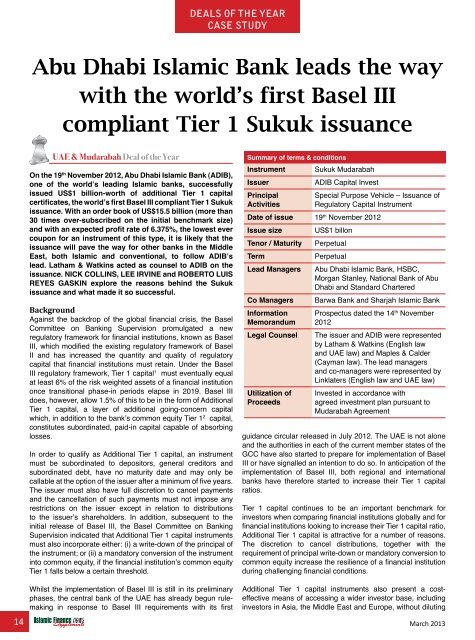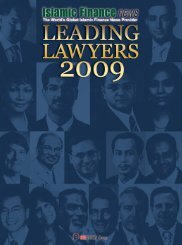View PDF Edition - Islamic Finance News
View PDF Edition - Islamic Finance News
View PDF Edition - Islamic Finance News
You also want an ePaper? Increase the reach of your titles
YUMPU automatically turns print PDFs into web optimized ePapers that Google loves.
deals of the year<br />
case study<br />
Abu Dhabi <strong>Islamic</strong> Bank leads the way<br />
with the world’s first Basel III<br />
compliant Tier 1 Sukuk issuance<br />
UAE & Mudarabah Deal of the Year<br />
On the 19 th November 2012, Abu Dhabi <strong>Islamic</strong> Bank (ADIB),<br />
one of the world’s leading <strong>Islamic</strong> banks, successfully<br />
issued US$1 billion-worth of additional Tier 1 capital<br />
certificates, the world’s first Basel III compliant Tier 1 Sukuk<br />
issuance. With an order book of US$15.5 billion (more than<br />
30 times over-subscribed on the initial benchmark size)<br />
and with an expected profit rate of 6.375%, the lowest ever<br />
coupon for an instrument of this type, it is likely that the<br />
issuance will pave the way for other banks in the Middle<br />
East, both <strong>Islamic</strong> and conventional, to follow ADIB’s<br />
lead. Latham & Watkins acted as counsel to ADIB on the<br />
issuance. NICK COLLINS, LEE IRVINE and ROBERTO LUIS<br />
REYES GASKIN explore the reasons behind the Sukuk<br />
issuance and what made it so successful.<br />
Background<br />
Against the backdrop of the global financial crisis, the Basel<br />
Committee on Banking Supervision promulgated a new<br />
regulatory framework for financial institutions, known as Basel<br />
III, which modified the existing regulatory framework of Basel<br />
II and has increased the quantity and quality of regulatory<br />
capital that financial institutions must retain. Under the Basel<br />
III regulatory framework, Tier 1 capital 1 must eventually equal<br />
at least 6% of the risk weighted assets of a financial institution<br />
once transitional phase-in periods elapse in 2019. Basel III<br />
does, however, allow 1.5% of this to be in the form of Additional<br />
Tier 1 capital, a layer of additional going-concern capital<br />
which, in addition to the bank’s common equity Tier 1 2 capital,<br />
constitutes subordinated, paid-in capital capable of absorbing<br />
losses.<br />
In order to qualify as Additional Tier 1 capital, an instrument<br />
must be subordinated to depositors, general creditors and<br />
subordinated debt, have no maturity date and may only be<br />
callable at the option of the issuer after a minimum of five years.<br />
The issuer must also have full discretion to cancel payments<br />
and the cancellation of such payments must not impose any<br />
restrictions on the issuer except in relation to distributions<br />
to the issuer’s shareholders. In addition, subsequent to the<br />
initial release of Basel III, the Basel Committee on Banking<br />
Supervision indicated that Additional Tier 1 capital instruments<br />
must also incorporate either: (i) a write-down of the principal of<br />
the instrument; or (ii) a mandatory conversion of the instrument<br />
into common equity, if the financial institution’s common equity<br />
Tier 1 falls below a certain threshold.<br />
Whilst the implementation of Basel III is still in its preliminary<br />
phases, the central bank of the UAE has already begun rulemaking<br />
in response to Basel III requirements with its first<br />
Summary of terms & conditions<br />
Instrument Sukuk Mudarabah<br />
Issuer<br />
Principal<br />
Activities<br />
ADIB Capital Invest<br />
Special Purpose Vehicle – Issuance of<br />
Regulatory Capital Instrument<br />
Date of issue 19 th November 2012<br />
Issue size<br />
Tenor / Maturity<br />
Term<br />
Lead Managers<br />
Co Managers<br />
Information<br />
Memorandum<br />
Legal Counsel<br />
Utilization of<br />
Proceeds<br />
US$1 billon<br />
Perpetual<br />
Perpetual<br />
Abu Dhabi <strong>Islamic</strong> Bank, HSBC,<br />
Morgan Stanley, National Bank of Abu<br />
Dhabi and Standard Chartered<br />
Barwa Bank and Sharjah <strong>Islamic</strong> Bank<br />
Prospectus dated the 14 th November<br />
2012<br />
The issuer and ADIB were represented<br />
by Latham & Watkins (English law<br />
and UAE law) and Maples & Calder<br />
(Cayman law). The lead managers<br />
and co-managers were represented by<br />
Linklaters (English law and UAE law)<br />
Invested in accordance with<br />
agreed investment plan pursuant to<br />
Mudarabah Agreement<br />
guidance circular released in July 2012. The UAE is not alone<br />
and the authorities in each of the current member states of the<br />
GCC have also started to prepare for implementation of Basel<br />
III or have signalled an intention to do so. In anticipation of the<br />
implementation of Basel III, both regional and international<br />
banks have therefore started to increase their Tier 1 capital<br />
ratios.<br />
Tier 1 capital continues to be an important benchmark for<br />
investors when comparing financial institutions globally and for<br />
financial institutions looking to increase their Tier 1 capital ratio,<br />
Additional Tier 1 capital is attractive for a number of reasons.<br />
The discretion to cancel distributions, together with the<br />
requirement of principal write-down or mandatory conversion to<br />
common equity increase the resilience of a financial institution<br />
during challenging financial conditions.<br />
Additional Tier 1 capital instruments also present a costeffective<br />
means of accessing a wider investor base, including<br />
investors in Asia, the Middle East and Europe, without diluting<br />
14 March 2013
















